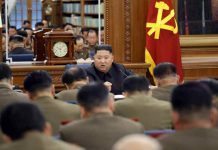[imText1]Following the nuke experiments, it has been suggested that though the chances that North Korea will take holistic provocative acts are low, it is likely that the nuclear issue will be used to enforce “indirect aggression” and interfere with South Korea.
Former secretary to the president for National Defense and visiting professor to Myongji University, North Korea Studies Professor Kim Hee Sang proposed in an interview with the Daily NK, “Though North Korea conducted nuke experiments, it will be difficult for North Korea to receive acknowledgement from the international community as a country possessing nukes” and analyzed “It is likely North Korea will take South Korea as a hostage and indulge in interfering acts and threats.”
He said “In a position of possessing nukes, it is possible that North Korea will urge demolition of South Korea’s national security and request wider gaps for North Korean movements and influences. If South Korea does not accept these requests, it is possible that South Korea will be threatened with an attitude “Then, are you waging war?”
As a former battalion commander and regimental commander, planning officer and secretary for National Defense, Blue House in the presidential period of the Roh Tae Woo, Kim Yong Sam, Professor Kim is well informed of security policies. He criticizes that non-militaristic sanctions such as the exclusion of military force, economic sanctions and talks alone will not be able to resolve the North Korea nuke issue.
He claims “It will be difficult to create an economic situation more difficult than the critical times experienced in the mid-90’s with purely non-militaristic sanctions. In spite of these severe economic trials and the world keeping an eye on North Korea, nuclear weapons were still created. If sanctions are advocated without military force, North Korea will not forfeit its nukes.”
“Kim Jong Il will only surrender nukes when his life or destruction to the regime is threatened”
Professor Kim said “For Kim Jong Il to surrender his nukes, he must either feel that his life is threatened or that his regime is going to collapse. Even amongst the circumstances where hundreds and thousands of citizens are dying of hunger, he continued to develop his nukes. It will not be easy for him to forfeit his nukes.”
Further he criticized “It (North Korean nuclear issue) cannot be resolved through talks alone” and “Until now, talks were ineffective. Also North Korea did not develop its nukes because the “Sunshine Policy” was deficient. Merely relying on talks is no different to tolerating North Korea’s nuclear development.”
Regarding the criticisms by Proliferation Security Initiative (PSI) he explained “The PSI works in collaboration with the world. The chances an arms conflict will arise is small because if a problem does occur, this will be a collective response by the world.”
Further he claimed “A dispute will not arise just because the PSI becomes involved” and said “If North Korea continues to pose threats and drags Korea through this issue, we will not be able to protect our democratic system by ourselves.”
In spite of the Kim Dae Jung-Roh Moo Hyun government’s Comprehensive Policy, he said in regards to North Korea persisting with nuclear developments “Reflections need to be made having seen the outcome of the Sunshine Policy” and urged “We must pull ourselves together if we are to prevent our future generation from living a wretched life as a hostage to North Korea.”
In addition, he rebuked “At present, we are faced with a serious security threat. In order to solve this issue, we must work in partnership with the flow of the international community and fall back on the flow of generations to work in cooperation with North Korea.”
Professor Kim Hee Sang has been known for his deep knowledge of North Korean issues in the division of warfare and policy, in particular military strategies. After graduating from Military Academy in 1968, Professor Kim studied at the Department of Foreign Affairs, Seoul National University. Later, he attended the U.S. Army War College and completed his graduate studies with Master of Public Administration from the University of Shippensburg, U.S. and in 2003 completed his Doctorate from the Department of Political Science and Diplomacy, Sungkyunkwan University. Professor Kim has also written various publications on “National Security in the 21st Century.”




















